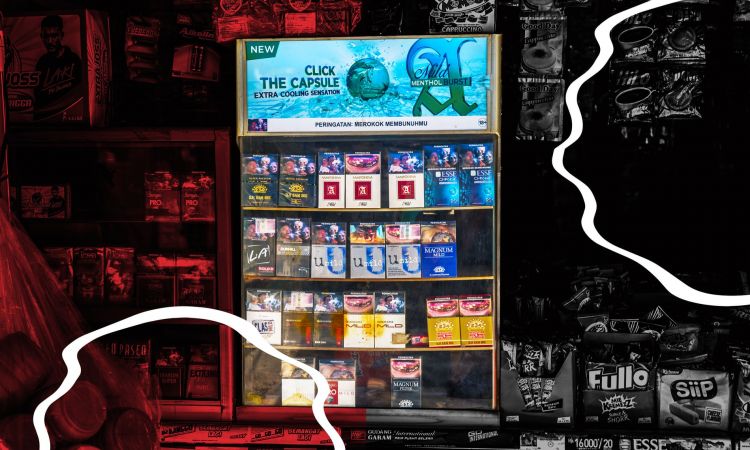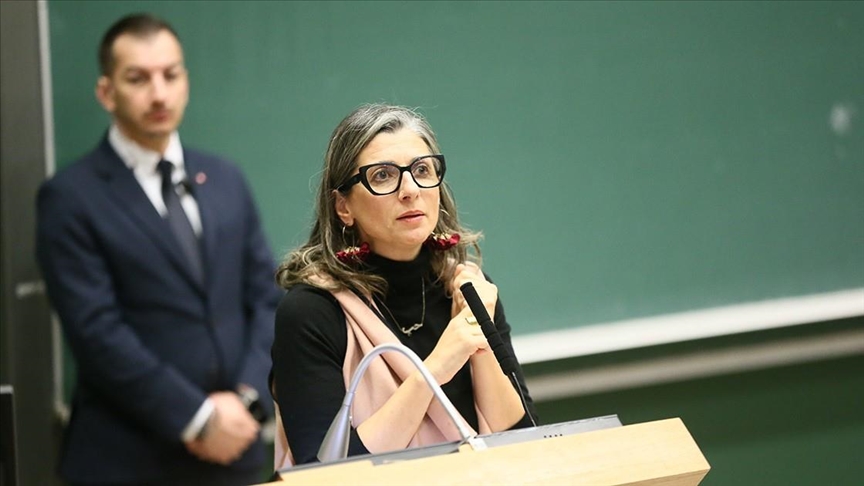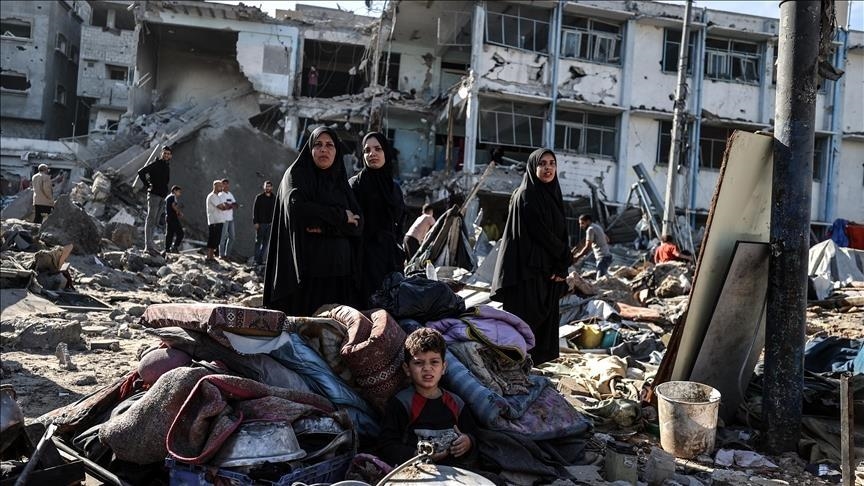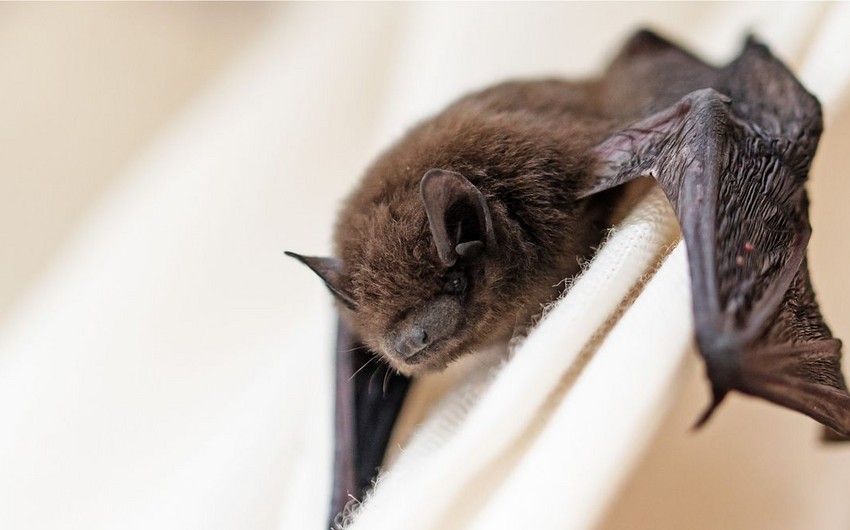Research in more than 22 countries found cigarettes are being sold and promoted near schools by an industry that needs to recruit the young to maintains profits.
School children around the world are being exposed on a daily basis to cigarette advertising and promotions by a tobacco industry that needs to recruit the young to maintain its vast profits.
A major investigation in more than 22 countries across four continents by campaigners and experts has found cigarettes on sale close to school gates and advertising which normalises smoking. Stalls and shops full of vibrantly colourful branding sell single cigarettes at pocket money prices alongside sweets and candies.
Marlboro cigarettes made by Philip Morris and British American Tobacco brands such as Pall Mall, Kent, Dunhill and Lucky Strike were being sold and promoted within 300 meters (984ft) or closer to schools in nearly all the countries researchers examined in a series of studies.
Brands made by Japan Tobacco and Imperial were seen near schools in a smaller number.
In Peru, Guardian correspondents corroborating the findings saw single sticks apparently for sale in corner shops near schools in flavours attractive to children, such as mint, lemon, berry, grape, cinnamon or combinations. In Indonesia they saw banner ads above stalls near a primary school and were told that tobacco company reps visit with free cigarettes and new promotional material every few months. In Delhi, India, they saw single cigarettes and tiny sachets of chewing tobacco for sale alongside sweets directly opposite school gates.
Big Tobacco denies promoting its products to children; Philip Morris International (PMI) said it does not market to children anywhere in the world and British American Tobacco (BAT) said it has strict rules against targeting children.
But experts stress the harm. “The evidence is sufficient to conclude that advertising and promotional activities by the tobacco companies cause the onset and continuation of smoking among adolescents and young adults,” said the US Surgeon General’s report in 2014.
There is plenty of evidence that children are choosing to smoke. The World Health Organisation’s global youth tobacco survey estimated that 14.6% of children ages 13 to 15 in India reported using tobacco in some form in 2010. In Indonesia in 2014, 36% of boys of that age and 4% of girls smoked or otherwise used tobacco. In Bangladesh in 2015, an estimated 9% of male youths and nearly 3% of female youths regularly used tobacco.
The Campaign for Tobacco Free Kids compiled and analysed reports from more than 22 countries since 2014 carried out by a range of public health groups, NGOs and Johns Hopkins University. The continuing research found alarming evidence of widespread advertising and promotional activities that could influence children to start to smoke and potentially develop a habit which could kill them.
In nearly all the countries surveyed, there were cigarettes or promotions on display close to sweets, soda drinks or stationery in shops or in stalls just outside schools, and often at the eye line of children. There was often vibrantly colourful branding, ‘power walls’ of products often near cashiers, and digital screens showing tobacco advertising. Banner ads bore the names of cigarette brands in letters sometimes larger than the name of the shop. Flavoured cigarettes were on sale and so were single sticks, which are more affordable for young smokers.
Researchers found that some of the few rules put in place to protect children had been breached. In one of the studies looking at Kiev, Ukraine, researchers showed a photograph showing how health warnings had been obscured with price stickers.
Lima: ‘It’s the youngsters who like them most’
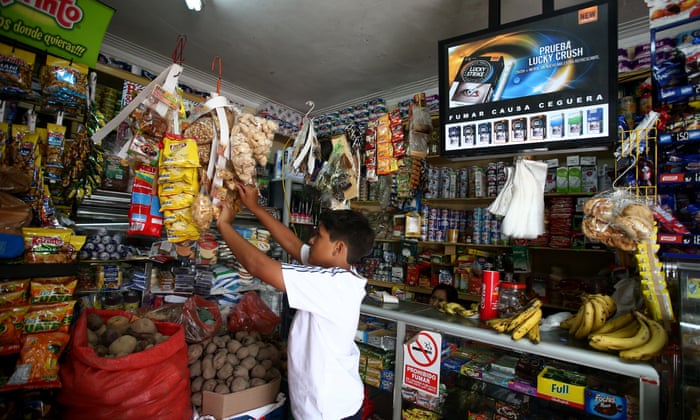
Lucky Strike advertised inside a bodega in Lima, Peru. Smoking starts on average at age 14 in Peru.
Dotted across Lima, the capital of Peru, the Guardian found colourfully marketed flavoured cigarettes being openly advertised in corner shops – known as bodegas – often a stone’s throw from schools. Romina Castro told how she was tempted by them to start smoking when she was 17. She liked the mint and lemon flavoured combination offered in a range of Lucky Strike cigarettes.
“They don’t have the bitter flavour of normal cigarettes,” the 21-year-old university student told The Guardian. “They just taste nicer.”
Sold in packs of 10 or 20, the Lucky Strike cigarettes come in nine different flavours including mint, lemon, berry, grape or cinnamon and, more recently, feature flavour combinations. Squeezing the filter on tiny labels that read ‘On’ with inwards pointing arrows bursts the crushable capsules inside and releases the liquid aromas into the inhaled smoke.
These popular new brands feature descriptions in English like ‘crisp’, ‘chill’ or ‘indigo’, which are even more attractive to young people, says Hugo Córdova, project manager for Peru’s principal anti-tobacco NGO COLAT . “They attract kids who think it’s the new fashion,” he says.
The cigarettes which could be seen as the smoking equivalent of alcopops, or flavored alcoholic drinks, are part of a massive marketing ploy by the tobacco industry, says Córdova, which includes incentives for vendors such as invitations to parties and cash rewards for product placement.
Hernán, 39, runs a busy corner shop in Lima’s San Isidro district. He is paid in packs of cigarettes worth 3,000 Peruvian soles ($922) every two years for giving space to two cigarette dispensers, he says, as part of a rolling contract with British American Tobacco Peru, the company which dominates the tobacco market in the country.
“It’s the youngsters who like them most,” he told the Guardian, insisting that no cigarettes were sold to clients who could not show ID proving they were over the age of 18. His store is not within the banned 250 meter range close to a school.
Cigarette advertising is banned outside the bodegas but features in bold colours inside.
In another cornershop, The Guardian saw cigarette packets stacked among the sweets and snacks in a glass-fronted counter, at the eye level of a small child.
Closer inspection showed open packets with some cigarettes missing. A likely indication – along with the lighter hanging on a piece of string by the door – that cigarettes were being sold individually which is not only against Peruvian law but widely seen as a ploy to encourage premature smoking.
In Peru, smoking starts on average at the age of 14, said Edgar Bellido, director of health promotion at Peru’s health ministry.
BAT Peru said it strongly opposed the sale of single cigarettes and said it was unfortunate the practice happened. The firm denied flavored products attracted young smokers. A spokesperson said: “On the contrary, the flavors only seek to deliver a different smoking experience to [well informed] adult smokers”.
Delhi: laws flouted
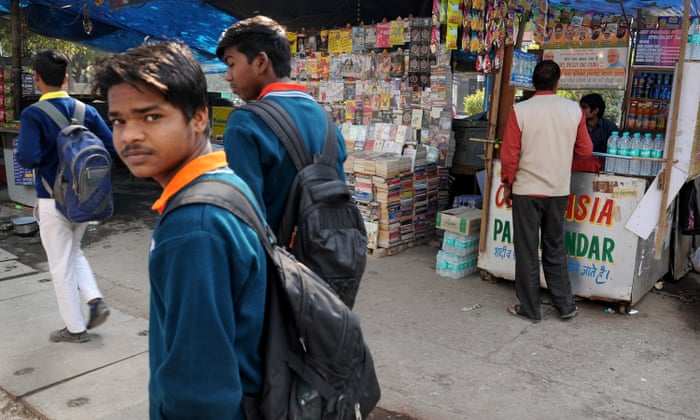
Students walking past a tobacco kiosk opposite the main gates of ASN Senior Secondary School in New Delhi, India.
India has laws against the advertising and sale of cigarettes within 100 meters of schools, but in Delhi it appears to be flouted in many places.
The day the Guardian visits there is a tiny tobacco kiosk in Mayur Vihar less than 100 yards from Ahlcon International School in New Delhi. The vendor stocks cigarettes and tiny sachets of guṭka, a chewable tobacco popular throughout India. Asked if he knows that the law prohibits him from selling his products within 100 yards of any school, the vendor replies: “No, I don’t know about that law but I do know that you shouldn’t sell tobacco to children. No one wants children to get the habit so I refuse if any young person comes to me.”
Nearby is ASN Senior Secondary School where two tobacco stands are situated directly opposite the main gates, on the other side of the road. Wedged between a fresh fruit stall, a fruit juice stand, and food and flower stalls, they look normal and innocuous to the school children who pass the shops twice a day. The kiosks themselves stock sweets, lollipops and chewing gum alongside the tobacco products. A single cigarette costs just 10 rupees (15c), affordable to a child.
In theory, India has stringent anti-tobacco measures in place. In 2003, the country passed a law banning tobacco companies from advertising at shops and banning the sale of tobacco and cigarettes near educational institutions throughout India. But anti-tobacco activists, campaigning to ensure that young Indians do not start smoking and become addicted, have found the law being flouted in numerous places in the city.
The Delhi High Court is examining a petition filed by activists demanding that the authorities enforce the ban but such court cases can take many years to reach any conclusion.
Dr Suresh Kumar Arora, chief tobacco control officer with the New Delhi government says enforcement is not easy. “Children are immature, they are influenced by peer pressure and they like to experiment and so they are the target of tobacco companies who know they can be their future customers,” says Dr Arora.
A Global Youth Tobacco Survey in 2009 showed that among children ages 13 to 15, over 14% used tobacco products and over 4% smoked cigarettes.
After three years of tearing down cigarette advertisements on kiosks and fining vendors selling near schools, Dr Arora says that his enforcement squads are finally beginning to see results, mainly because he got tough with the cigarette companies last year, giving them an 30 April deadline to stop distributing posters.
“We were wasting our time fining cigarette vendors and distributors. They had no idea of the law. Most are illiterate. Our teams would tear down posters and in no time, they would be up again because the real culprits were the big tobacco companies – ITC, Philip Morris, Godfrey Phillip. I told them to stop giving posters to their dealers otherwise I would drag them through the courts. Since last May, Delhi has been free of tobacco posters, 100% free,” he said.
But keeping the kiosks away from schools is proving harder. The city has around 1,030 government schools and about 1,000 private schools. Dr Arora has one enforcement squad for each district.
In February he ran a month-long special, intensive drive with squads visiting 15 to 20 schools every day to check for tobacco stalls and declaring those that have no stalls or advertising near them ‘tobacco-free’. But even if Dr Arora’s teams managed to remove the kiosks, vendors on mobile carts came and parked outside schools.
Indonesia: free cartons for vendors
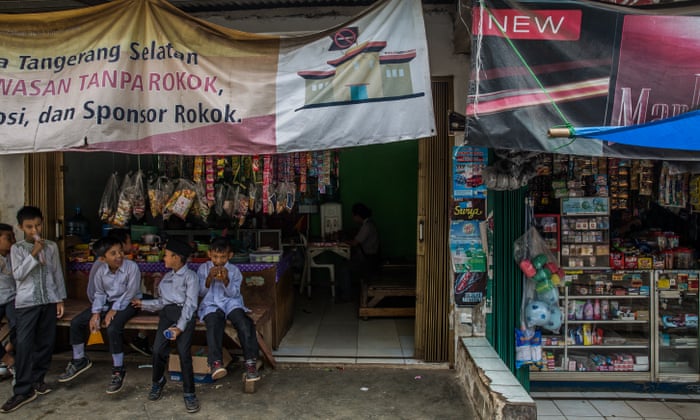
Indonesian schoolchildren at a food stall with an anti tobacco banner, next to stalls with cigarette advertising and products on sale opposite a school.
The view from the turquoise entrance gates of SDN Ciater 4 primary school in Serpong, on the outskirts of the Indonesian capital, is a string of roadside stalls littered with tobacco ads. One features a picture of a sleek red racecar with smoking tyres that reads: “Test your limits, go international.” It’s for a local clove brand, Gudang Garam.
The adjacent banner, a plainer design with a single calligraphy style ‘A’, from the local Sampoerna brand, now owned by Philip Morris, merely advertises its low price: rupiah 20,000 [$1.45] per pack.
“That?” asks the stall owner of the Sampoerna banner hanging outside her stall which sells sweets alongside tobacco. “Someone from the cigarette company gave it to me. They gave me a carton of free cigarettes too.”
Representatives from tobacco companies visit her stall about once every three months, she says, offering fresh new signs for free. Sometimes they even customise them, printing the name of her stall, Toko Reza, in the corner. “I think it’s okay,” says Siti Rodziah, a mother of three, as she contemplates the banner and its proximity to the school gates, “Children are not allowed to buy cigarettes and I wouldn’t sell them to them anyway.”
The tobacco industry is big business in Indonesia, contributing $10.5bn in taxes each year, and has created some of the country’s richest men. Tobacco advertising is everywhere – at roadside stalls, on billboards and music concerts, late night on TV, and even at sporting events. Jakarta has banned advertising on billboards around schools. Banners have instead been tacked to stalls, fences and even trees.
“There’s no monitoring, regulation or tax, and you can put up a lot,” says Lisda Sundari, from Yayasan Lentera Anak, an NGO focused on protecting children. “It’s even more dangerous because now they can get closer to their target, to schools, homes and stalls near homes, much deeper into a community.”
In protest, two of the stalls in the street in front of SDN Ciater 4, which don’t sell cigarettes, have hung banners declaring they are against tobacco advertising and promotion near schools, part of an initiative from the nearby high school and several local NGOs. Teacher Sri Lestari admits they can’t force the stallholders to take their pro-tobacco ads down, even though she loathes that a “quick death” is marketed so close to the school gates.
Asked about the Sampoerna banner, Philip Morris International said it was committed to complying with regulations in each market it operates and for Sampoerna this meant “making every effort not to place any cigarette advertisements (shop signboards, billboards, and banners) inside or within 100 meters of educational facilities.”
“Given the large number of retailers throughout Indonesia, mistakes can happen, however we strive to make every effort to ensure that our communications are only directed at adult smokers.”
It said the banners close to SDN Ciater 4 primary school had now been taken down.
Indonesia manufacturers Gudang Garam and Djarum did not respond to requests for comment.
‘In Africa some young people use tobacco twice as much as parents’

Cigarettes on sale alongside sweets in a smoking zone in Nairobi, Kenya.
Investigations by the Campaign for Tobacco-Free Kids show that tobacco companies are targeting children, said Mark Hurley, global director of communications. “In every country where we have looked, in lower and middle-income countries in eastern Europe, Latin America, Africa and Asia, we have seen tobacco companies like Philip Morris International and British American Tobacco aggressively advertising to kids,” he said.
“We’re seeing schools and playgrounds in the major cities surrounded by advertising for Marlboro and Lucky Strike among others. This is not an accident. It is part of a tactic by global tobacco companies to secure lifelong customers for their products.”
The advertising, the sale of flavoured cigarettes and single sticks often placed in stores at children’s eye level along with sweets and candy and sugary drinks are not prohibited in many low and middle-income countries. “It is not necessarily a violation of the law but when we see a high density of tobacco advertising around schools, it is a tactic that is targeting kids,” he said. “Both BAT and PMI have pledged not to target kids.”
The tobacco companies may blame stallholders or wholesalers. “They may say it isn’t us, but ultimately it is their brands and they are responsible,” he said.
“There is ample evidence to show that when kids are first exposed to tobacco branding and try their first cigarette when they are children, they are much more likely to become lifelong smokers.”
Dr Vinayak Prasad, programme manager of WHO’s Tobacco Free Initiative said: “The tobacco industry strives to hook children at young ages to tobacco by promoting and selling their products around schools. But many countries are working to block such practices by bringing in policies that restrict sale near schools, including Thailand.
“The tobacco industry is consistently looking to expand its market through enticing children and youth to take up tobacco.
“In a number of countries in Africa, children and youth use tobacco twice as much as their parents because the industry has successfully managed to attract children through advertising, sponsorship and promotion.” That was now the case in Nigeria, Botswana, Uganda and South Africa.
Responses from tobacco firms
A PMI spokesperson said: “Preventing children from smoking is of the highest priority and we take very seriously our responsibility to ensure that we do not market to children anywhere in the world … strictly preclude the use of materials deemed attractive to minors.”
PMI said they work with retailers and comply with all relevant regulations.
A British American Tobacco spokesperson said: “Our products are for adult smokers only and ... under-age smokers are not, and will never be, our target audience, anywhere in the world … products and marketing should never appeal to, or engage under-age smokers.
“Across the world, we have very strict rules to ensure we do not have outdoor advertising within 100 meters of a school – as the minimum standard … and work with mobile vendors to ensure they do not sell tobacco products near schools.”
A spokesman for Imperial Brands said it sold products responsibly which meant “ensuring that our product and brand communications are not aimed at, or made appealing to, people under the age of 18 or non-smokers, and that we operate in accordance with local laws”.
JTI did not respond to a request to comment but says on its website that “minors should not smoke and should not have access to tobacco products”, which it says is central to its “marketing practices”. It adds: “JTI is committed to playing a full role in youth smoking prevention, but ultimate success depends on all elements of society working together.”
Countries studied by researchers
Neighbourhoods were researched in countries including Argentina, Bangladesh, Benin, Bulgaria, Bolivia, Bosnia & Herzegovina, Burkina Faso, Cameroon, Georgia, India, Indonesia, Kenya, Moldova, Nicaragua, Nigeria, Pakistan, Peru, Romania, South Africa, Switzerland, Uganda, and Ukraine.

